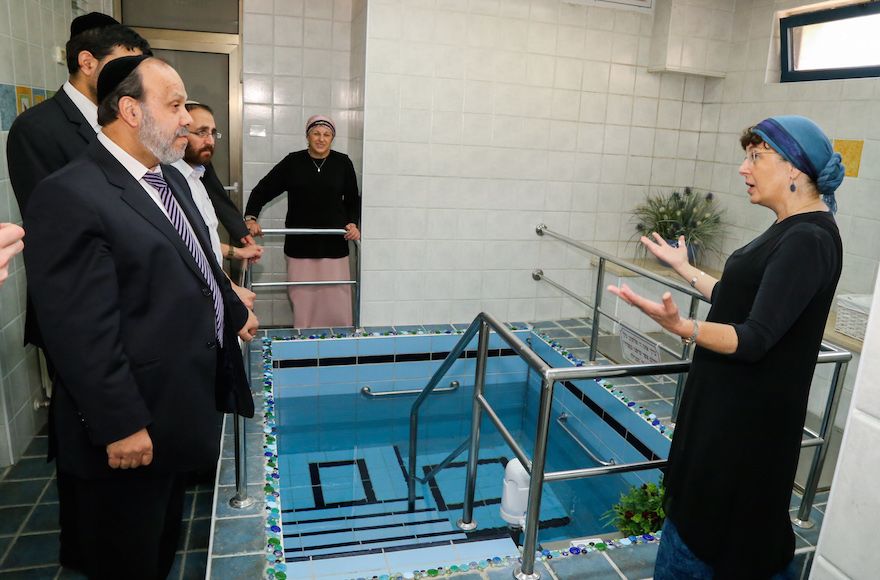Bill restricting non-Orthodox mikvah use passes initial Israeli Cabinet vote
Published March 14, 2016

Israeli Minister of Religious Services David Azulay visits a luxury mikvah in the Israeli settlement of Alon Shvut, as he tours the Gush Etzion bloc on August 25, 2015. (Gershon Elinson/Flash90)
TEL AVIV (JTA) — A bill that would bar Conservative and Reform conversions from taking place at public Israeli ritual baths passed an initial Cabinet committee vote.
The vote Sunday in the Ministerial Committee on Legislation obligates Israel’s governing coalition to support the bill when it reaches the Knesset floor, though subsequent votes will be delayed until the coalition agrees on the bill’s wording. The bill was proposed by the haredi Orthodox United Torah Judaism faction, and supported by the haredi Shas party, as well as by some members of the Religious Zionist Jewish Home party.
Only three members of the 12-member committee were present for the vote on the bill, which passed 3-0. The remaining nine members chose to be absent, according to reports. Those who voted reportedly were Yariv Levin of the Likud party, David Azoulay of the Shas Party and Yaakov Litzman of the United Torah Judaism party.
The bill was proposed in order to override a February Israeli Supreme Court decision mandating that the ritual baths, or mikvahs, be open to Conservative and Reform conversions. Along with prohibiting that practice, the law also may require that women must immerse under the supervision of a mikvah attendant, who would ensure that the immersion is conducted according to Orthodox Jewish law.
Members of Jewish Home, along with the center-right Kulanu party, objected to the wording of the mikvah attendant provision, according to Israeli reports. The bill will not be passed until the factions reach a consensus wording.
Religious pluralism ativists and non-Orthodox leaders objected to the Cabinet vote. Israeli Conservative Movement CEO Yizhar Hess said the bill was “a law opposing the Jewish people.” Israeli Reform Movement CEO Rabbi Gilad Kariv wrote on Facebook Sunday that the bill hurts modern Orthodox Jews as well as the Conservative and Reform movements.
“Integrity, fairness and pleasantness are apparently not part of their 613 commandments,” Kariv wrote, referring to the haredi parties. “Gradually, there’s an ever-sharper recognition that the divide is not between Orthodox and Reform, but between those who believe in a Jewish and democratic state and those who want a theocracy and halachic state according to Shas and United Torah Judaism.”














